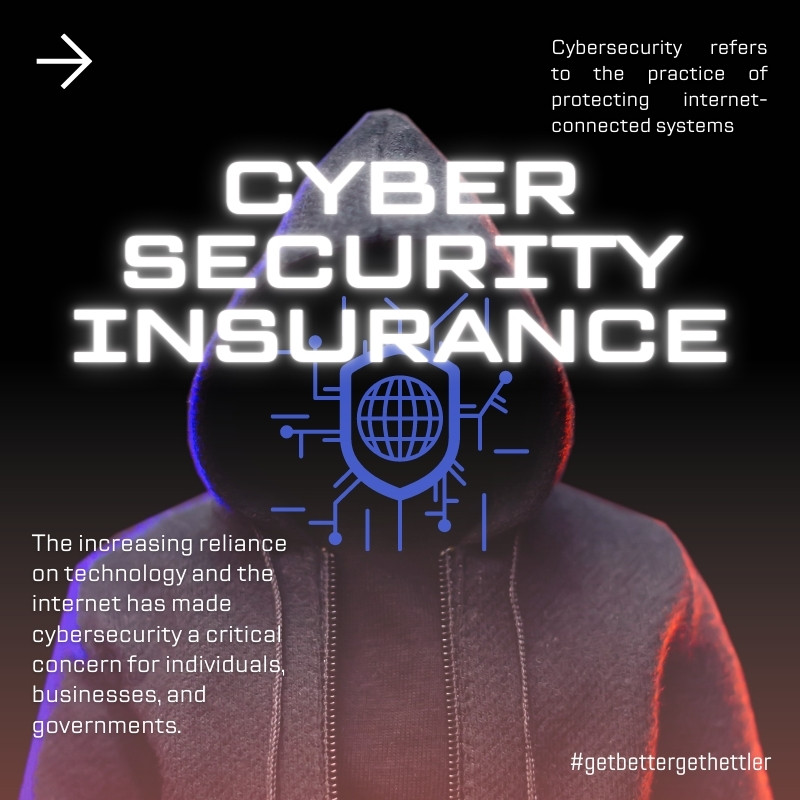In today’s increasingly digital world, cybersecurity has become one of the most critical concerns for individuals and businesses alike. The rapid expansion of online services, the rise in e-commerce, and the growing sophistication of cybercriminals have made South Africa a significant target for online threats, including data breaches, ransomware attacks, phishing, and other forms of cybercrime. As a result, cyber insurance is gaining traction as a key element in protecting businesses and individuals from the financial fallout of these threats.
In South Africa, where internet penetration is steadily growing, and digital transformation is accelerating, the need for cyber insurance is more pressing than ever. With high-profile incidents such as the 2020 Tembisa Hospital cyberattack and the 2017 South African Revenue Service (SARS) breach, the country is seeing an increasing number of cyber incidents, which have caused significant financial and reputational damage. As the digital threat landscape evolves, understanding how cyber insurance works, why it’s important, and what it covers is crucial for safeguarding assets and operations.
What is Cyber Insurance?
Cyber insurance is a policy designed to help businesses and individuals manage the risks associated with cyberattacks and data breaches. It provides coverage for financial losses, legal fees, and recovery costs in the event of a cyber incident. The policies vary based on the type of coverage they offer, but most cyber insurance products focus on protecting against the following risks:
- Data breaches: Protection against the unauthorized access, theft, or exposure of sensitive data, such as customer information or intellectual property.
- Ransomware: Coverage for costs associated with ransomware attacks, where hackers demand payment in exchange for unlocking encrypted files or systems.
- Business interruption: Compensation for losses due to downtime caused by a cyberattack, such as system outages or disruptions to services.
- Legal and regulatory costs: Costs associated with lawsuits, fines, and legal settlements due to a breach of data protection laws like POPIA (Protection of Personal Information Act) in South Africa.
- Cyber extortion: Coverage for expenses related to dealing with cyber extortionists who threaten to release or destroy data unless paid a ransom.
While cyber insurance cannot prevent cyber incidents from occurring, it provides financial protection and support to mitigate the aftermath of these attacks, helping to recover lost data, restore systems, and reduce business disruption.
Why is Cyber Insurance Important in South Africa?
South Africa has become a prime target for cybercriminals due to several factors, including its relatively high internet penetration rate, the rapid digitalization of businesses, and the country’s role as a regional hub for commerce in Africa. In 2020, South Africa was ranked among the top 10 countries globally with the highest number of cyberattacks, and data from the South African Cybersecurity Institute suggests that the number of cyber incidents continues to rise.
There are several reasons why businesses and individuals in South Africa should consider purchasing cyber insurance:
1. Rising Cybercrime Threats
Cybercriminals are becoming more sophisticated, using advanced tactics like phishing, malware, ransomware, and denial-of-service attacks to exploit vulnerabilities. The COVID-19 pandemic accelerated digital adoption, but also created new entry points for cybercriminals as businesses shifted to remote working models and digital services. As a result, the frequency and severity of cyberattacks have surged.
2. Regulatory Compliance (POPIA)
In South Africa, businesses are required to comply with the Protection of Personal Information Act (POPIA), which came into effect in July 2021. POPIA mandates that businesses protect the personal information of their customers, employees, and clients. Failure to comply with data protection laws can result in hefty fines and legal liabilities. Cyber insurance can provide coverage for the legal fees, fines, and penalties that may arise in the event of a data breach or non-compliance with POPIA.
3. Financial Protection Against Data Breaches
The financial implications of a cyberattack can be devastating. The costs associated with a data breach can include legal costs, data recovery, public relations to repair reputational damage, customer notification, and credit monitoring for affected individuals. Without cyber insurance, businesses may find it challenging to cover these expenses, potentially jeopardizing their operations.
4. Business Continuity
For many businesses, a cyberattack can lead to a disruption of services or a shutdown of operations, particularly if key systems or data are compromised. Cyber insurance can help cover the loss of income and business interruption costs during these downtimes. It also supports businesses in restoring systems and ensuring they can get back to normal operations as quickly as possible.
5. Reputational Damage Control
Beyond financial costs, a cyberattack can also cause severe damage to a business’s reputation. Customer trust is essential, and a breach can lead to a loss of confidence in the brand. Cyber insurance may include public relations expenses to help manage and mitigate reputational harm, ensuring that businesses can rebuild trust with their customers and partners.
What Does Cyber Insurance Cover?
Cyber insurance coverage can vary depending on the insurer and the specific policy, but typical cyber liability insurance policies in South Africa include the following:
1. Data Breach Coverage
This is one of the most important components of cyber insurance. It covers the cost of managing a data breach, including legal fees, the notification of affected individuals, and credit monitoring services. It also covers the costs of restoring or repairing compromised data.
2. Ransomware and Cyber Extortion
Ransomware attacks are a significant concern for many businesses, and cyber insurance often includes coverage for the ransom payment, as well as the costs of recovering data and repairing IT systems. In addition, businesses may be covered for extortion-related costs if a cybercriminal threatens to leak sensitive data unless a ransom is paid.
3. Business Interruption
A cyberattack can disrupt business operations for days, weeks, or longer. Business interruption coverage helps to compensate for lost income due to downtime or reduced capacity caused by a cyber event. This includes coverage for lost revenue, additional costs for alternative services, and the costs of restoring critical systems.
4. Third-Party Liability
Cyber liability insurance also often includes coverage for third-party claims. If a breach affects a customer or business partner, you may be legally responsible for damages, fines, or lawsuits. Third-party liability coverage helps to cover legal defense costs and any settlements or judgments related to lawsuits filed against your business.
5. Cyber Crime
Policies typically cover losses from online fraud and cybercrime, including fraudulent transactions and identity theft. This coverage can also help businesses recover funds that were stolen through hacking or social engineering tactics like phishing or business email compromise (BEC).
6. Forensic and Crisis Management
Cyber insurance may include the costs associated with forensic investigations to determine the cause of the attack, data recovery, and incident management. This also includes the cost of hiring cybersecurity experts to secure systems after a breach, as well as crisis management professionals to handle public relations and customer communications.
Choosing the Right Cyber Insurance Policy
When selecting a cyber insurance policy in South Africa, businesses and individuals should keep the following factors in mind:
1. Risk Assessment
Conduct a thorough cyber risk assessment to understand your vulnerabilities and identify the potential costs associated with a cyberattack. This will help you determine the level of coverage you need.
2. Tailored Coverage
Ensure that the policy covers the specific risks your business faces. For instance, an e-commerce business may have different coverage needs than a financial institution or a healthcare provider. Look for policies that offer flexibility and can be tailored to your industry and needs.
3. Policy Limits
Check the policy limits and ensure that the coverage is adequate to handle the potential costs of a cyberattack. Consider factors such as the size of your business, the amount of sensitive data you hold, and the potential consequences of a breach.
4. Cybersecurity Requirements
Some insurers may require businesses to meet certain cybersecurity standards before issuing coverage. This could include ensuring your systems have adequate firewalls, encryption, multi-factor authentication, and regular security updates.
5. Reputation of the Insurer
Choose an insurer with a good reputation for handling claims and providing responsive customer service. Look for insurers with experience in managing cyber claims and offering additional services like incident response support.
Conclusion
As cyber threats continue to escalate in South Africa, cyber insurance has become an essential safeguard for businesses and individuals seeking to protect themselves against the financial and reputational risks of online theft and cyberattacks. Cyber insurance provides peace of mind by offering financial protection, covering the costs of recovery, legal fees, and business interruption, and ensuring that you are prepared to handle the complexities of a cyber event.
In a world where cyber threats are constantly evolving, investing in a robust cyber insurance policy tailored to your needs is no longer optional but a critical component of your overall risk management strategy. Whether you are a small business owner, a large corporation, or an individual, understanding the importance of cyber insurance and choosing the right coverage will help you stay secure in an increasingly digital world.




